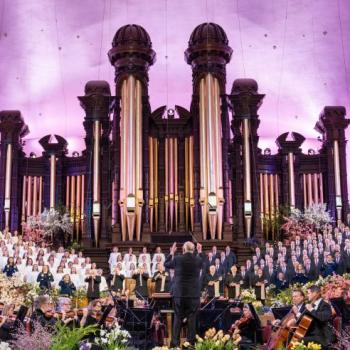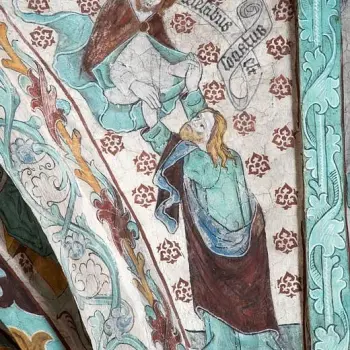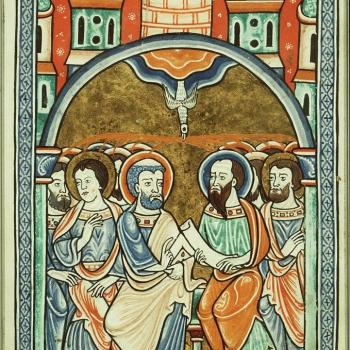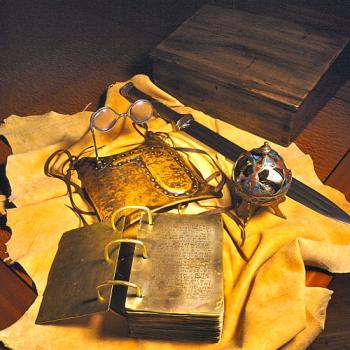Moroni 7:10 in Context of Temple Patterns
Wherefore, a man being evil cannot do that which is good; neither will he give a good gift.[1]
This single sentence encapsulates truth taught in holy temples of man’s mortal struggle to choose between the God who offers salvific and eternal life and a god who vainly offers his followers temporal power and cloaked misery.
During Moses’ theophany, he experienced the glory that is God. After that experience ended, Satan appeared to Moses demanding Moses’ worship. Discerning the difference between God and Satan, Moses declined. Moses again called “upon the name of God…[and] beheld his glory.” God blessed Moses with gifts: knowledge, a divine commission, and an endowment of power.[2]
Recounting knowledge gained as an initiate, Moses described the premortal council, creation of the world, and fall of man. This revelation followed the same pattern as his theophany: introduction to God who identifies man as His offspring, introduction of Satan, then the reappearance of God who institutes covenants through knowledge, divine commission, and an endowment of power.[3]
In the temple, “[t]he word endow has two related meanings: ‘to bestow a gift’ and ‘to clothe upon.’ In this context, the temple endowment is a sacred gift whereby we are clothed with blessings from God. The endowment can only be received in His way and in His holy temple.”[4]
In the temple drama, coveting God’s honor, Lucifer offered a gift and was cast down. Joseph Smith taught that “the gifts of God are all useful in their place, but when they are applied to that which God does not intend, they prove an injury, a snare and a curse instead of a blessing.”[5] Thus, “a man being evil cannot do that which is good; neither will he give a good gift.”
Moroni 7 follows the same pattern Moses outlined.
Mormon directed his discourse on faith, hope, and charity to initiates—peaceable followers of Christ. God gifted the recipients of Mormon’s letter with the incredible knowledge that because of their covenant relationship, they could presently and in futurity enter His rest.
Mormon next included a discussion of good versus evil, followed by covenantal language, divine commission, and an endowment of power.
Alma also taught that initiates followed this pattern. Some were ordained “on account of their exceeding faith and good works; in the first place being left to choose good or evil; therefore they having chosen good, and exercising exceedingly great faith, are called with a holy calling….Therefore they were called after this holy order, and were sanctified, and their garments were washed white through the blood of the Lamb…and there were many, exceedingly great many, who were made pure and entered into the rest of the Lord their God.”[6]
Moroni 7:10
In a day of depravity, desperate struggle to survive, and apostasy, peaceable followers of Christ had to choose. Mormon’s prophetic counsel reminded his people that they were experiencing a personal extension of Moses’ theophany in real time. God had introduced Himself, and because they had chosen good, He promised the Comforter—eternal rest.
“Every good gift and every perfect gift is from above, and cometh down from the Father of lights, with whom is no variableness, neither shadow of turning.”[7]
But they still could choose. Would Mormon’s peaceable followers stand steadfast or turn? Mormon cautioned against the one choice that would destroy their rest. “Wherefore, a man being evil cannot do that which is good; neither will he give a good gift.”
Because “[t]hus saith the Lord concerning all those who know my power, and have been made partakers thereof, and suffered themselves through the power of the devil to be overcome, and to deny the truth and defy my power….Having denied the Holy Spirit after having received it, and having denied the Only Begotten Son of the Father….”[8]
According to the pattern, Satan introduced himself, and despite Mormon’s warnings, some peaceable followers apparently “loved Satan more than God.”[9] Mormon lamented that “the Spirit hath ceased striving with them…they are also seeking to put down all power and authority which cometh from God; and they are denying the Holy Ghost. And after rejecting so great a knowledge…they must perish soon.”[10]
And so perished peaceable followers who experienced both the good gift and evil’s counterfeit and chose evil and, in the temple context, were cast down.
[1] Moroni 7:10
[2] Moses 1
[3] Moses 2-4
[4] https://www.churchofjesuschrist.org/temples/what-is-temple-endowment, accessed 6 January 2025
[5] History of the Church, 5:31–32
[6] Alma 13:3,11-12
[7] James 1:17
[8] Doctrine and Covenants 76:31,35
[9] Moses 5:18
[10] Moroni 8:28-29













